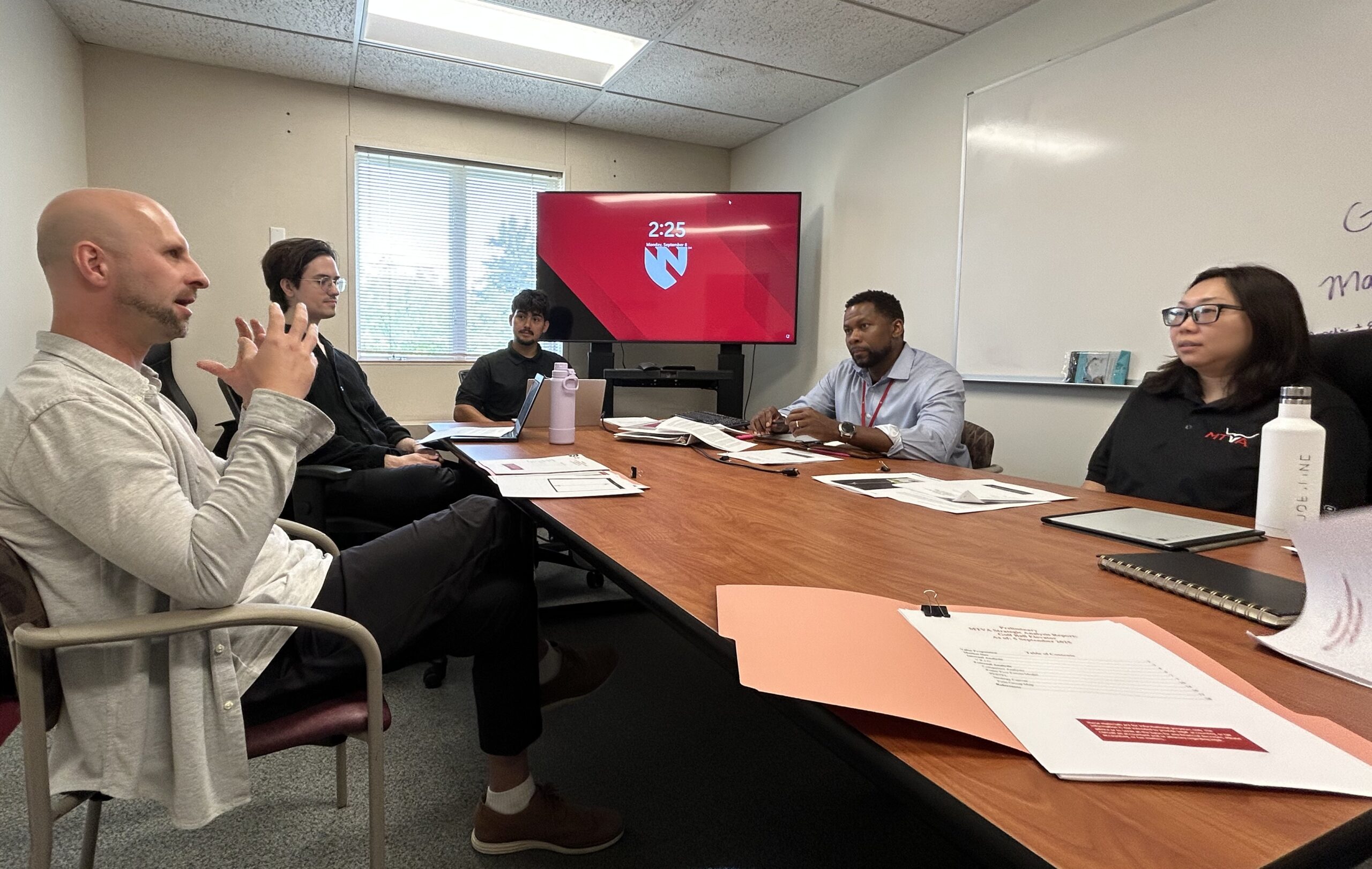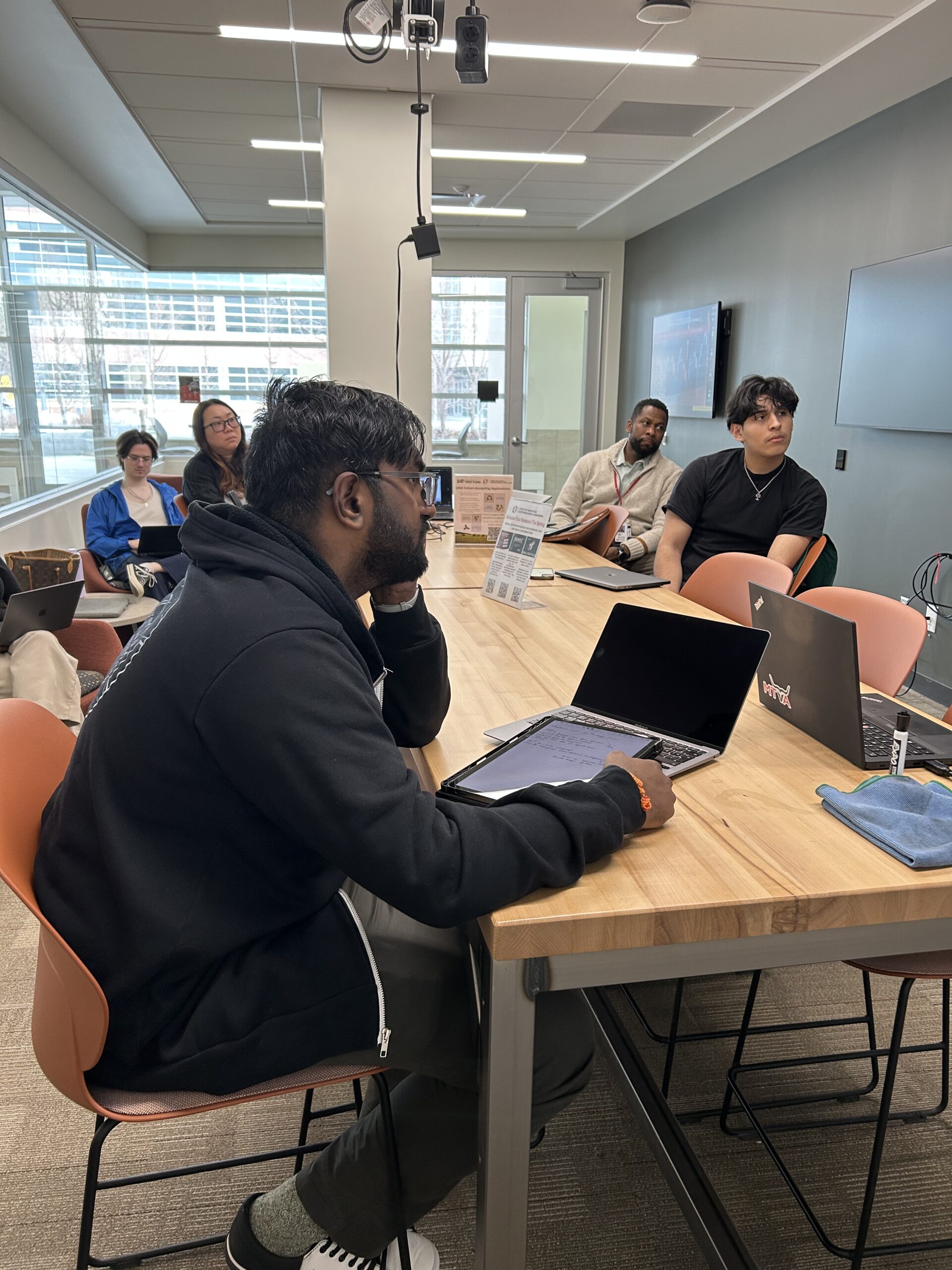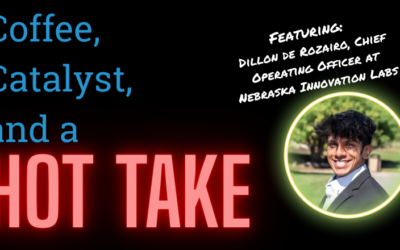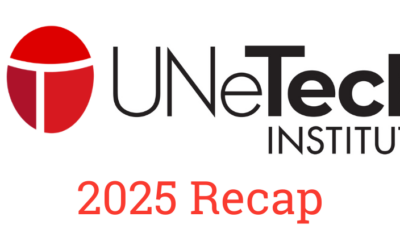Some of UNeTech’s most enduring success stories start not in a lab, but with a conversation. This one began years ago in a campus conference room, over coffee and whiteboards, when the question was first asked: What if we didn’t just file patents? What if we helped students, researchers, and entrepreneurs build companies?
The Maverick Technology Venture Alliance (MTVA) was born from that question—and from a shared desire to make sure great ideas didn’t just collect dust on a shelf. Today, MTVA is not only a testament to how far the University of Nebraska has come in building a culture of entrepreneurship; it’s a vision of where we’re going together.

Maverick Technology Venture Alliance students and advisors outside of Mammel Hall at University of Nebraska Omaha
The Roots of the MTVA: A Problem Worth Solving
Born out of the Omaha Medical Technology Pipeline and UNeTech’s early commitment to bringing innovation out into the world, the Institute needed a partner to find best practices in entrepreneurship, strategy and voice of customer. Going back to its roots as a shared institute between UNO and UNMC, UNeTech saw the college of business as a natural home for its programs but struggled to find a partner.
That’s where Brent Clark, an associate professor of entrepreneurship at the University of Nebraska at Omaha, entered the story. His academic research and teaching focused on startup theory and lean business model development—and he brought that vision to the table when he collaborated with UNeTech and OMTP to create what would become the Maverick Technology Venture Alliance.
Together, they started piloting the idea: could graduate and undergraduate students from UNO build commercialization pathways for inventions coming out of UNMC and beyond? Dr. Clark, along with Stephen Hug, UNeTech’s Entrepreneur-in-Residence, and Erik Peterson, a seasoned entrepreneur and UNO instructor, brought the program from theory to practice. They led MTVA’s early cohorts, coaching students as they built feasibility studies, market analyses, and business models for real biomedical innovations. Lamonte Russell was hired as UNeTech’s Manager of Strategy and Ventures and replaced Peterson in 2023.
Clark, Russell, and Hug work directly with MTVA students so they can gain real-world experience with UNeTech startups. The work they do is customized and detailed for each startup, and it’s the kind of research new companies spend thousands of dollars and hundreds of hours to generate.
According to Hug, student development of the Business Model Canvas and external market analysis are the most crucial items students develop for clients. “These tools provide startup companies with a clear strategic framework and a grounded understanding of their market landscape, enabling them to make informed decisions and accelerate their path to viability,” Hug said.
For Clark, the most important research the MTVA generates is most often customer discovery. Customer discovery includes calling potential clients to ask unbiased questions about the day-to-day jobs customers do to determine if there truly is a need for an invention. Customer discovery helps determine if the problem an invention has been created solve, truly is a problem worth solving. “This sort of data is embedded within people and can’t be generated simply by comparing numbers of looking up industry data,” Clark said. “It only comes by engaging with potential customers and having conversations about subjective value and personal experience.”
A Symbol of Collaboration
MTVA is, in many ways, more than a program—it’s a symbol.
UNeTech itself is a joint institute between UNO and UNMC. That partnership is easy to overlook in the day-to-day, but MTVA makes it visible. While our UNMC office is nestled in Annex 32, at UNO our home is Mammel Hall, surrounded by the faculty, students, and mentors who give this program its energy. That physical split mirrors the strength of the partnership: two institutions, one purpose.
For several years now, generations of students—many of whom may never have set foot in a lab—have worked on medical device and software innovations coming directly out of the clinical and research work of Nebraska’s medical community. They’ve sat in the same room as surgeons and biomedical engineers, asked tough questions, and proposed viable business plans.
MTVA offers students more than a class or internship. It offers them a chance to step into a real-world problem and contribute to something tangible. And in doing so, it reminds Omaha what UNO and UNMC can achieve when they work together—something our community sees more of every year.
“This partnership connects academic insight with practical application, preparing students for their future careers and enabling them to make meaningful contributions to Nebraska’s innovation ecosystem,” Hug said. “It represents a strong collaboration that boosts the educational and research missions of both institutions. For me, it highlights the immense value of offering UNO students real-world experiential learning opportunities, guided by experienced entrepreneurship faculty and business leaders.”

Clockwise MTVA Faculty and Advisors: Dr Brent Clark, Stephen Hug, Lamonte Russell

MTVA meeting with industry expert for upcoming technology.
From Grant to Growth: A Bold New Chapter
Like many programs at UNeTech, MTVA began with support from the Economic Development Administration (EDA). Those early grant dollars made it possible to pilot new ideas, support students, and prove the value of the work. It was EDA funding that allowed MTVA to grow from a hypothesis into a flagship program.
But as of this year, something meaningful has changed.
For the first time, MTVA is jointly funded by UNO and UNMC themselves. Not through a grant or foundation, but as part of their own investment in innovation. That shift matters. It signals that the value of this program isn’t just experimental—it’s essential. External funding helped to create the program, but the grant cycle doesn’t always line up with the needs of students, innovators, entrepreneurs or investors. The work of the MTVA needs reliable support.
“This partnership has been a homerun in so many ways,” Clark said. “The impacts to students and inventors have been far reaching for many years now. To see UNO and UNMC come together to fund the program into the future is clear evidence that the benefits are highly valuable to both sides. It’s really been satisfying to see leadership on both sides recognize this.”
This shift in funding reflects both the symbolism and the spirit of MTVA. It marks a maturity—a moment where we, as a university system, are no longer testing the waters of innovation and entrepreneurship. We’re swimming in them.
It also reflects a bold vision: that the programs UNeTech starts can—and should—find permanent homes in the community, in classrooms, in citywide ecosystems. That the spark of a grant-funded idea can ignite lasting institutional change.
What Comes Next
The work isn’t done. The future of MTVA lies in the next cohort of students, the next generation of UNO innovators, and the next big idea that walks through UNeTech’s doors. But if you walk the halls of Mammel Hall during an MTVA session, or peek into a Zoom call where students are pitching prototypes to clinical inventors, you’ll see something rare: belief in possibility. And the potential for growth.
“I would love to see the MTVA expand to provide services to community technology startups in addition to our current focus on university tech startups,” Clark said.
Hug said he would like to see expansion in customer discovery. “Deepening engagement with potential users and stakeholders will not only validate ideas early but also sharpen product-market fit—significantly increasing the likelihood of success for UNeTech startups,” he said.
Wherever the future leads the MTVA, we’re proud of the roots of this program. We’re proud of the people who built it. But more than anything, we’re proud to share this space between two great institutions, and to keep building what comes next.

MTVA meeting in the Entrepreneurship lab at UNO’s Mammel Hall.



